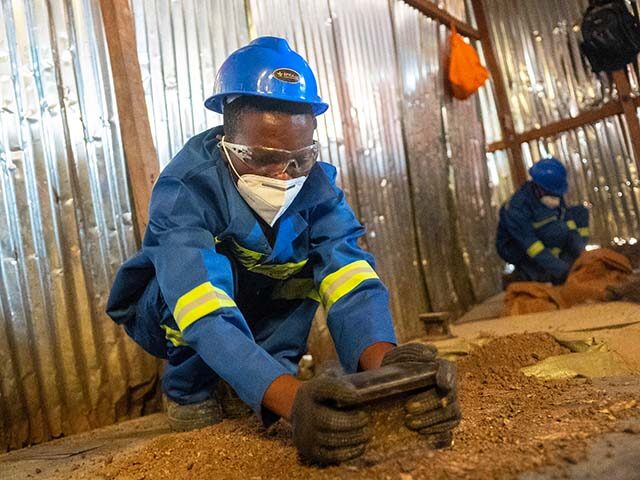The United States Institute of Peace (USIP), a think tank based in Washington, DC, issued a report Monday that advised the U.S. to develop stronger trade relationships with African countries in order to become less dependent on Communist China for vital minerals.
The USIP report noted that the U.S. has sound economic and strategic reasons to diversify its supply chain for vital minerals such as cobalt, graphite, and manganese.
The U.S. is currently “at or near 100 percent reliant on ‘foreign entities of concern’ – mainly the People’s Republic of China – for key critical minerals,” and global demand is steadily accelerating, driven by the “global transition to nonfuel-based energy sources, including high-end batteries for electric vehicles and power storage.”
“Critical minerals are also essential to powering all manner of consumer electronics, medical supplies, and high-performance metals and engines, including those used for defense and military applications,” the report added.
The current status quo leaves the U.S. “vulnerable to export controls and potential market manipulation by geopolitical competitors,” a problem USIP suggested alleviating by helping African nations develop their mining industries in a healthy and sustainable manner:
The development of natural resources on the continent has had a checkered past, and critical minerals are no exception. Ventures of the Russian-led paramilitary Wagner Group in Mali, Sudan, and elsewhere are cases in a long history of predatory mining activities in Africa. Thus, it should not be assumed that the global rush for critical minerals will be beneficial to African development and security.
Here, the United States, its allies, and the private sector can play a positive role – including by offering a better alternative to an approach to extracting Africa’s critical minerals common to Chinese companies, which too often has offered little local value and has resulted in corruption and human rights abuses, including child labor exploitation. U.S. mining and related companies could be much more engaged, however, as they remain largely absent from the continent.
USIP noted that increased U.S. government support for private sector investment in African markets has not driven China or Russia into retreat. On the contrary, “the list of economic competitors in Africa is growing” as oil-rich Gulf states and other buyers develop a keen interest in Africa’s mineral wealth.
The report’s list of 13 policy initiatives to give the U.S. a stronger presence in African tiptoed around a few huge competitive disadvantages, the biggest one being that African national governments are not exactly bastions of progressivism and human rights.
Russia and China offer riches and geopolitical benefits to African rulers with no human rights strings attached. China is very aggressive about telling Third World nations that its rationally self-interested and non-judgmental authoritarian government makes a better business partner than arrogant, hypocritical, mercurial American and European democracies.
The brutal Wagner Group mercenaries referenced by USIP are active in African nations because nervous kleptocratic rulers and military juntas want them there. Wagner has looted the Central African Republic’s gold mines under the guise of “protecting” them, for example, while also serving as a Praetorian guard for President Faustin-Archange Touadera.
The juntas in Niger, Burkina Faso, and Mali are also turning away from the U.S. and Western-aligned groups like the Economic Community of West African States (ECOWAS) and seeking security partnerships with Russia, because Moscow does not handle security threats with kid gloves, and it does not harangue military dictators about their failure to hold democratic elections.
Niger expelled French counter-terrorist troops in December and canceled a decade-old security pact with the United States in March, paving the way for Wagner mercenaries to move in from their bases in neighboring Burkina Faso and Mali. The U.S. condemned Niger’s coup, while late Wagner boss Yevgeny Prigozhin congratulated the junta. On March 15, Niger strongman Col. Amadou Abdramane declared the American presence in Niger to be “illegal” and complained about the “condescending attitude” of visiting U.S. representatives.
Another obstacle USIP did not linger upon was the growing resistance of African leaders to what they view as Western cultural imperialism, especially in the area of LGBTQ rights.
Last year brought a surge of what Amnesty International (AI) called “discriminatory legislation directed against lesbian, gay, bisexual, transgender, and intersex persons across Africa.” The Biden administration has threatened to cut off humanitarian aid to Uganda over its “Anti-Homosexuality Act.”
This is another area where China and Russia are not going to lecture African leaders or threaten economic sanctions against them. Likewise, USIP suggested all American investments in Africa “must be thoroughly vetted to ensure compliance with human rights, child labor, environmental, and other high standards and laws” – an understandable imperative, but Moscow and Beijing are prepared to skip all that vetting when they hammer out deals with African leaders.
USIP suggested inviting African nations to join the Mineral Security Partnership (MSP), a U.S. State Department initiative that currently includes closely allied countries like Canada, South Korea, the United Kingdom, and Japan. India joined the MSP during Prime Minister Narendra Modi’s visit to the United States in June 2023.
The notion of inviting African countries into the MSP has been floated before, as in the case of a Carnegie Endowment for International Peace paper in October 2023. The problem is that some of the most important invitations would go out to highly unstable countries like the Democratic Republic of Congo (DRC) and countries like South Africa that have grown somewhat chilly toward the U.S. and Europe. The potential member with the warmest feelings toward the U.S. at present would probably be Zambia, and even Zambia has been stubborn about keeping its strong ties to China intact.
Africa clearly has resources that could make diversifying away from dependency on China possible, as the USIP report recommends, provided these political hurdles can be overcome. China will realize this as well and can be expected to try countering whatever moves the U.S. makes.

COMMENTS
Please let us know if you're having issues with commenting.